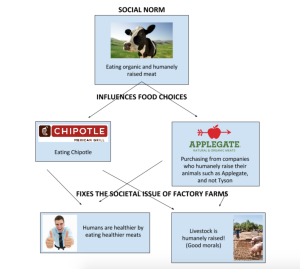Chipotle serves, “food with integrity.” This means that Chipotle uses only meat where the animals were raised humanely without any antibiotics or added hormones, serves non GMO organisms (flora and fauna), and without artificial preservatives. When Chipotle became popular in my hometown (they built one right near my high school), it became the place where everybody would go together after high school, on dates, or for a casual weekend meal. People began to consume food choices that were healthier and organic rather than inhumanely raised or GMO. Eating from places like Chipotle where meat was humanely raised became a social norm. Chipotle’s advertisement of healthier meat changed how people from my high school began to view food and the choices they made in eating their food, especially when it came to foods coming from factory farms. The awareness that Chipotle spread about livestock influenced the way people at my school ate, and Chipotle became a place where people could trust their food and know exactly what they were putting into their bodies.
A societal issue that connects to this social norm is how livestock is raised. There is a documentary I have watched called Food Inc. that exposes how animals are raised in factory farms. This is why I think it is so important to eat at restaurants such as Chipotle where the animals are not abused and inhumanely slaughtered. The animals are often raised in tightly crowded cages, given feed that makes them sick, and given antibiotics and without enrichments. The meat that comes from factory farms are often contaminated due to mass and careless production, thus affecting our health when we consume these meat. Therefore, the social norm should be to purchase and consume only organic and humanely raised meat. If people were to make themselves aware of which companies use factory farms, such as Tyson, or become aware of how a company raises food before financially supporting them by purchasing from that company, factory farms might cease to exist. This social norm would create a positive health movement and promote environmental friendly farms.


Hi Dorish! My name is Kara. Like you, I enjoy Chipotle. One opened up near my hometown and that was the place to eat. I also agree that I feel like I can trust Chipotle with their humanely raised meats. I feel as if I cannot with most other restaurant and fast food restaurants. However, lately the outbreak of E-coli has worried me some. I also agree that animals that are raised in crowded cages and etc. is very inhumane. Here is the link to my blog if you would like to check it out.
http://geog030.dutton.psu.edu/2016/03/04/module-6-social-norms-and-food-choices-kara-timmons/
Hi Dorish, my name is Johnna. Your post caught my eye because it relates to a place we’ve all probably eaten once or twice. I think it’s really cool how Chipotle chooses the “food with integrity” method. I’ve eaten there plenty of times and never knew that. It’s important to know where your food comes from. If more restaurants adopted Chipotle’s methods there would be a lesser affect on our health and environment.
You can refer to my blog at: https://wp.me/p3RCAy-bMg
Hey Dorish! My name is Kayla! I really enjoyed your post, mainly becasue Chipotle is one of my favorite restaurants. While I also mentioned Chipotle in my own blog post, I used it as an example of a place I eat at a lot. I like how you brought up that the livestock their meat comes from is free of added hormones, artificial perservatives and so on. I think it is very important to know where your food comes from and how the animals are treated and what they are given. Overall, your post was very informative.
Here is the link to my own blog post if you wanted to take a look:
http://geog030.dutton.psu.edu/2016/03/04/food-choice-and-social-norms-10/